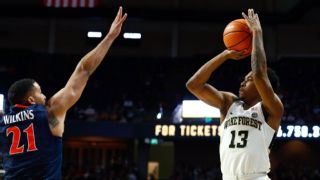|
Posting a piece saying that Virginia plays excellent defense might seem like the ultimate "well, duh" exercise, but keep an open mind, please. This season Virginia is playing really, really excellent defense. The Cavaliers are holding conference opponents to 0.83 points per possession. Not only have we never seen a number that low from this or any other team over the past decade in ACC play, Tony Bennett's defense is extraordinary and possibly historic even when controlling for strength of schedule. As has been excitedly pointed out on numerous occasions this week, the Cavaliers currently show the best number for adjusted defensive efficiency in the 17 seasons of Division I data compiled by KenPom. In other words, this "defense of the decade" discussion is at least plausible.  Basically, Isaiah Wilkins, Devon Hall, Kyle Guy, Ty Jerome, Jack Salt & Co. are putting up the kind of advanced numbers that one would expect when a defense holds a top-25 opponent like Clemson to 13 second-half points. What might be even more interesting, though, is the particular way in which Virginia is playing defense in 2017-18. Bennett hasn't been content to rest on his defensive laurels and has introduced at least one large wrinkle. For starters, consider that, relative to each season's league average, this is Bennett's worst defensive rebounding team in ACC play to date. You're reading that correctly, worst. Thus far, the Cavaliers have pulled down 68 percent of their conference opponents' missed shots, a number that actually has improved over the past three games. Being sort of bad or at least mediocre at defensive rebounding isn't exactly the approved method for playing some of the best bottom-line defense the sport has seen in the last decade, but that is precisely what's taking place in Charlottesville. Giving up more offensive boards to opponents hasn't much mattered, for two reasons: First, Virginia is outstanding at forcing misses inside the arc. ACC opponents are converting just 42 percent of their 2-point tries. That figure is six full percentage points better than what UVa recorded in conference last season, not to mention six percentage points lower than this season's league average. Second, Virginia is forcing far and away the highest rate of turnovers of Bennett's tenure. Naturally, no one thinks to call this team "Press Virginia" because the Cavaliers' conference games are played at a slower than customary tempo. Then again, maybe that pace is helping create turnovers and not a bug. In retrospect, maybe we should have seen that Virginia's pace probably possesses an intrinsic nuisance value (a bit like the Syracuse zone) when flung up against opponents totally unaccustomed to an opponent looking and playing this way. Even before this season, UVa showed a rate of turnovers forced that suspiciously and consistently outperformed the ACC average. But they've taken takeaways to an entirely new level this season. Opposing offenses have coughed up the ball on 25 percent of their offensive trips. Couple that with a tempo dialed in at 60 possessions per 40 minutes, and you can see that opponents are put under enormous pressure to make every single scoring opportunity count. In effect, an opponent's going to get, on average, just 45 chances to score in a game against Virginia. Opposing offenses simply have little or no experience playing within such a constricted window of opportunity, and it shows. (By the way, I will not rest until I see "45 CHANCES" on UVa warm-up gear.) Seeing a pack-line program forcing turnovers like this has to be little short of terrifying for other teams. Since the pack-line's inception, the implicit bargain presented by the scheme to opponents was, "Yes, it's going to be a pain to face but at least you'll get a lot of bites at the scoring apple." If on the other hand it turns out that defenses really can keep opponents out of the paint and lead their conference in takeaways, that will be a very big thing indeed. Bennett is of course a defensive magician, but a healthy share of credit here has to go to his players. The defense played by Wilkins, for example, has inspired unique levels of adulation from UVa fans and corresponding measures of apprehension and foreboding from opponents. Yet during his team's already infamous second half of defense against Clemson, the 6-foot-7 senior was on the floor for just three minutes. The Tigers still scored just 13 points against this "short-handed" D. Does Virginia have the defense of the decade? Maybe. One break the Cavaliers have caught this season is the presence of 14 other ACC teams that, so far, have made just 34 percent of their 3-pointers in conference play. It also hasn't hurt that North Carolina and Notre Dame are simultaneously having their worst (though of course still very good) seasons on offense in the past four years. Lastly, veterans of the 2015 Virginia team like Justin Anderson, Malcolm Brogdon, Anthony Gill and Darion Atkins would probably point out that, by a hair, they actually had the better per-possession defense in ACC play relative to that season's league average. That being said, it's still January, a rather important road date at Duke looms Saturday and this season's Cavaliers definitely have an opportunity to earn defense of the decade honors. It's 2018, and Virginia really does play excellent defense. Even more excellent than you would assume.
|

